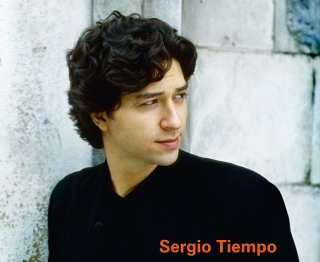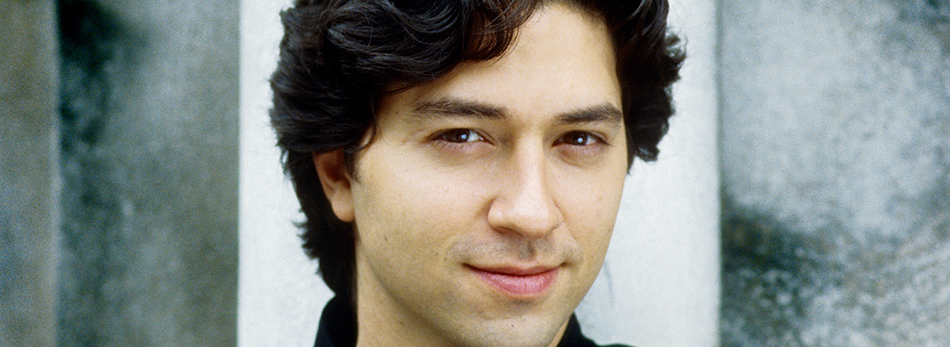TIEMPO’S TANTALIZINGLY
TEMPESTUOUS TEMPO
Sergio Tiempo is the real deal. When a pianist can take a work as familiar as Tchaikovsky’s 1874 First Piano Concerto and turn it into an exciting Olympic event, I’m more than sold. Appearing at a packed Disney Hall this morning (in a program that runs through Sunday), the very cool and jovial Venezuelan was down to some serious business, but was never out to impress (he knows this concerto well, having recorded it back in 2011).
Casually wearing an untucked lustrous white button-down shirt with the collar up, and his thick dark hair on the wild side, Tiempo was indeed ready to work. The power he provoked from the piano alone was worth the price of admission, but consider his savvy, authoritative, crisp virtuosity: He didn’t overcompensate with the pedal, instead sustaining chords at the end of an arpeggio; he performed some runs nearly twice as fast as I’ve previously encountered, but it never felt rushed; and he’s introspective without laboring on the quieter passages.
Then there’s the technique. All fingers get equal weight, yet the melody came out crystal clear. Aside from having strong curvature, his fingers would fall gracefully down from the keys in a choreographic flourish after some incredibly graceful runs. And while he was lovingly congenial on gentler passages — with his fingers looking as though they were pebbles skimming over a pond — wait until you see those rigid knuckles on the octave work.
So impressed was the audience (which can normally be more subdued at an 11:00am show) that their applause took awhile to peter out after the first movement; this made Tiempo positively giddy and the more he bowed his head to the audience, the more they applauded. This made him joyful, then we laughed, which halted the smiling guest conductor Xian Zhang, which caused more tittering, which really made this a heartwarming moment. (Equally touching was his encore, the Prelude Op. 28, No. 4, well-known for having been played at Chopin’s own funeral; in Tiempo’s hands, the normally melancholic piece came off as reflective prayer more than despair.)
As always, the enormous string sections were placed to the left, directly in front of and to the right of the conductor, but they were in a completely different configuration than normal, so I wonder if that accounted for the few times that the players — always consummately precise — were a little out-of-sync with Tiempo. Short and strong, with long, swooping, awesome arms that would make Michael Phelps dizzy, Zhang made the strings subdued but lush, and she kept things moving at a mighty swell clip, especially in the first movement (and there were some really nice licks from the woodwinds in the second).
Nothing was missing in the Prokofiev’s Sixth Symphony, and this is where the non-Dudamel string placement really paid off. LA Phil is to be given credit for championing this dark post-WWII work (1947), which is easy to appreciate but tough to love. The Shostakovichian-sounding Sixth seems to spring from a shell-shocked soul. The first movement is dyspeptic; the second peevish; and as in a bout of willfulness, the third is a circus-y galop. Regardless of how one feels about the 43-minute work’s lack of… what? melody? amiability? accessibility..?, this is some showcase for the mighty LA Phil players. The entire percussion team was on fire, and my favorite moment came courtesy of a duet between Lou Anne Neill’s harp and Joanne Pearce Martin’s celesta.
The Chinese and classically flavored 8-minute Ge Xu (Antipathy) opened the program with a firecracker bang. Composer Chen Yi sure knows how to use the orchestra. The 1994 work starts with a pounding, slapping, apocalyptic march, but surprises at the end when all is halted into a rumination, punctuated by harp into a sudden, long stillness (hence “antipathy,” which means an instinctive contrariety). The folk elements, such as pitch-bending and wooden blocks, were layered and cushioned with Psycho-like strings and stealthy percussion, including bongos and kettle drums.
This is a very well-balanced program, but you’ve simply got to see Sergio Tiempo.
photos courtesy of LA Phil
Los Angeles Philharmonic
Xian Zhang, conductor
Sergio Tiempo, pianist
ends on December 10, 2017
for tickets, call 323.850.2000 or visit LA Phil



